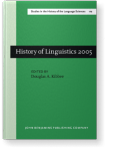Quels facteurs (linguistiques ou historiques) considérer dans l'accord en français? Étude de certains cas dans le Journal de la langue française (1784) d'Urbain Domergue
E-Jung Choi | University of Illinois at Urbana-Champaign
In this article, we show how the arguments for French agreement rules change in the history of French grammatical thought. We examine three syntactic structures chosen from the Journal de la langue française (1784-1792) and the factors - “historical” or “linguistic” - that grammarians invoke for recommending agreement, or no agreement. In one structure, the agreement is between a participle and a preceding noun, in another between an adjective and a noun, and in the third between a collective noun subject and the following verb. Starting from the analysis of the arguments of Urbain Domergue, expressed in his Journal de la langue française, and continuing through those of today’s linguists, we see both “historical” and “linguistic” factors evoked to explain agreement rules. In the eighteenth century, we find that a formal (mathematical) analysis true to the ideals of Enlightenment was favored. Current linguists take a more lenient attitude toward variation than did Domergue.
Article language: French
Cited by (1)
Cited by one other publication
Janice Carruthers, Mairi McLaughlin & Olivia Walsh
2024.
Historical and Sociolinguistic Approaches to French,

This list is based on CrossRef data as of 8 july 2024. Please note that it may not be complete. Sources presented here have been supplied by the respective publishers.
Any errors therein should be reported to them.
